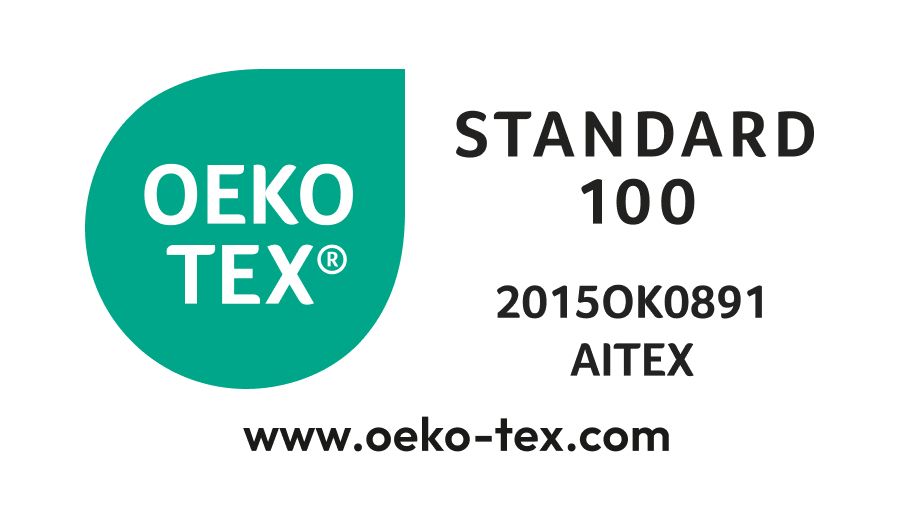Top Out




Real size sample
Fabric photo scans are shown as a guide and there may be colour variations depending on your screen. We recommend that you request a fabric sample before placing your order.
EN ISO 12947-2
50.000 Martindale cycles
EN ISO 12945-2: 4-5
(scale 1-5; 5 best value)
EN ISO 105-B04 (Lightfastness to weather) : 7-8
(scale 1-8; 8 best value)
EN ISO 105-X12
Dry: 4-5 | Wet: 4-5
UNE EN ISO 13934-1
Warp: >1000 N | Weft: >1000 N
UNE EN ISO 13937-3
Warp: 164 N | Weft: 158 N
UNE EN ISO 13936-2
Warp: 2,50 mm | Weft: 2,00 mm
Hydrostatic pressure test:
EN ISO 811
285 (Average cm/H2O)
UNE EN ISO 105-E01: 4-5
(scale 1-5; 5 best value)
UNE EN ISO 105-E02: 4-5
(scale 1-5; 5 best value)
UNE EN ISO 105-E03: 4-5
(scale 1-5; 5 best value)
UE: EN 1021 1
UK: BS 5852 0
USA: CAL TB 117 Section 1
USA: NFPA 260 Class 1
ISO 16603 Method C : Pass
UNE EN ISO 105-E01: 4-5
(scale 1-5; 5 best value)
Water repellent


Recommendations for upholstery of fabrics of Polyolefin material (Polypropylene).
With the experience of more than 25 years manufacturing textiles of Polyolefin material (Polypropylene), Exit Fabrics recommends to our customers to reinforce the seams with a double overlock and with an additional support. Due its “intrinsic” characteristics being a plastic material, this textile could be opened by sliding seams, these are the same characteristics that give it a magnificent durability and a better aging than other synthetic fibers.
The best way of protecting your Outdoor fabric from wear and tear and loss of colour is to keep it clean and protected during inclement weather.
To prevent overall soil, frequent vacuuming, or light brushing to remove dust is recommended. Most dirt and stains can be cleaned if they are promptly treated. The fabric can be washed at low temperature (<90°F / 30°C) with lukewarm water using a mild soap.
Treat stains as soon as they appear.
Blot spills, liquids, or greasy stains with absorbent paper.
Gently clean the stain with a clean cloth soaked in a solution of lukewarm water and a few drops of neutral detergent. Do not rub.
Always work from the outside in to prevent the stain from spreading.
Once the stain is eliminated, let it dry at room temperature.
Do not use the upholstered furniture until the fabric is completely dry.
Do not use under any circumstances high-pressure cleaning machines (Kärcher type), which project a powerful water jet onto the upholstered furniture.
Improper cleaning damages the fabric and its properties.
Do not dry in electric or gas dryers and avoid to ironing the fabric. Excessive heat will shrink the fabric. Do air or line dry.
Store it protected from inclement weather.
Do not place next to reflecting surfaces or heating elements.
Non-greasy marks: warm water spot clean with half a spoonful of any standard washing powder in a cup of hot water. Blot the stain with a cloth or a sponge dampened with this solution, from the outside to the inside of the stain. Do not rub it. Once the spot is removed, sprinkle the area with clean water to remove possible traces of powder. Do not use stain removers. If using a chlorine-rich cleaner, do not leave it to dry in direct sunlight.
Oil or grease spots: Butter, oil, lipstick, and the like must be removed with acetone. Once the mark has been removed, apply a solution of washing powder to the fabric and rinse it off with clean water exactly as for stains that are soluble in water.
Although the Outdoor fabrics by Exit Fabrics are for the exterior, mould and fungi may appear if the fabric remains damp for too much time.
Although the Outdoor fabrics by Exit Fabrics are resistant to UV rays, prolonged exposure to sunlight will eventually affect the resistance and colour of the fibres. Particularly in very hot climates, it would be better to look for shade as much as possible, or create it, by means of parasols, canopies or plants, and use protective coverings when the furniture is not in use.
The Outdoor fabrics by Exit Fabrics are water-resistant, but the rain often contains dirt and atmospheric pollution that may cause wear and tear on the fabric, and prolonged exposure to rain and dampness may cause the appearance of mould and fungi and, in addition, it damages the fabric as this affects its technical characteristics. For these reasons, the cushions should be put away separately or the furniture protected by coverings when the weather forecasts is of rain, and never leave the furniture exposed to rainy weather or dampness for a long time.
During the winter or when the furniture is not going to be used for a lengthy period, it should be put away or covered with protective coverings. Before putting it away, the fabric must be clean and completely dry. Avoid keeping it in damp places. On putting them away, it is better not to wrap the cushions in plastic since this may cause the appearance of moulds or fungi.
This Outdoor fabric of Exit Fabrics is offered with a waterproof PU laminate applied on the back, protecting the upholstery filling from rain and spills. It is ideal when the furniture contains foam not suitable for outdoor use.
PU laminates do not have indefinite durability; their adhesion and resistance depend on
We reserve the right to modify the technical specifications without prior notice.
Download digital catalogWe would be delighted to attend to you if you have any doubt that may arise regarding this or other information.